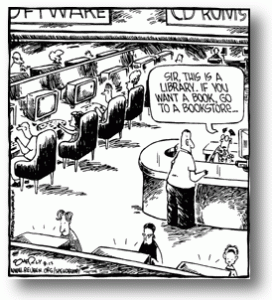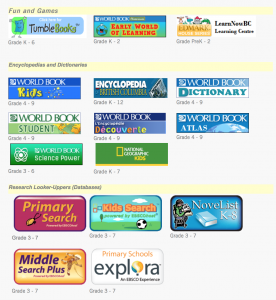Photo courtesy of http://libr.org/juice/pics/cartoon.gif
When I saw the above cartoon, it is a red alert to me: is that what our library is heading towards, online resources replacing the printed ones? I definitely hope not.
In this theme, we studied different types of reference resources. There is no competition that the most commonly used ones are the online resources, which has the benefit of 24/7 access. I purposefully focus my study on resources that I pay little attention to: the printed reference resources session in the school library.
I teach at two different schools in the Surrey School District. At one of the two schools, the library has two shelves housing two sets of World Books (2007), one set of Britannia, a few dictionaries and thesauri, and a few copies of atlases dated 2010. They are neatly arranged on the shelves, indicating that they are seldom touched or used by students and staffs. I acknowledge that a few copies of dictionaries, thesauri, and atlases are kept in classroom for easy access during class time, therefore, those in the library remain unused by students. From the reading in Riedling (2013), I learned that reference books are supposed to be replaced with updated copies every 5 years. As the reference books in the school library are all considered “outdated,” I concern if they will be replaced by updated print copies, or will be weeded without replacement? Hence, I approached my administrator to discuss my concern. In her opinion, she would anticipate that the reference books will be weed without replacement. Her reasoning is that the replacement is pricey, and as the district has a district-wide subscription of the online version, there is no reason to spend the pricey cost for a printed replacement.
A screenshot of the Surrey School District Elementary Online Database
In fact, that happened at the other Surrey school that I teach at. A day before the Spring Break, I went to the school library, planning to do an evaluation on the reference session. To my surprise, I could not find any World Books, encyclopedia, dictionaries, etc. As the librarian at the school works on a different day as I do, I approached the administrator and question on the situation. Her response was coherent with the administrator’s at the other school. Because students have 24/7 access to the district online database, it is unreasonable to pay a pricey cost for a printed version of the same resources.
I asked myself: if I were the teacher-librarian at the school, will I insist on purchasing the printed reference resources? Considering the limited budget that school libraries receive for new resources each year, would I give up on the printed reference resources, but use the budget in purchasing resources or books suggested by the staffs at school? I am still debating on the matter, and have not come to a conclusion yet. Maybe, I do not have a choice as it could possibly be a district decision, not mine.
Reference:
Riedling, Ann Marlow, Loretta Shake, and Cynthia Houston. Reference Skills for the School Librarian: Tools and Tips. Third ed. Linworth, 2013. Print.


